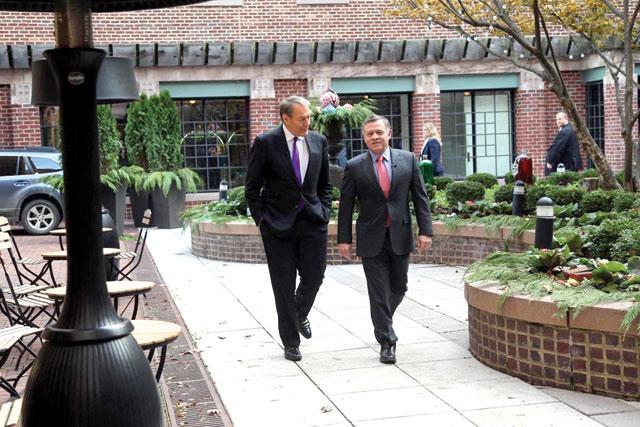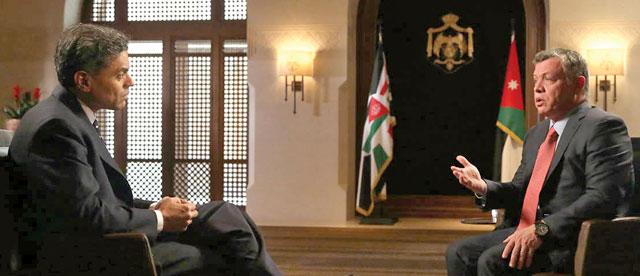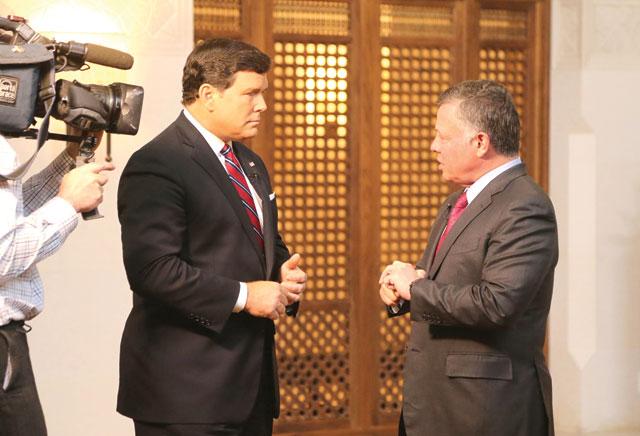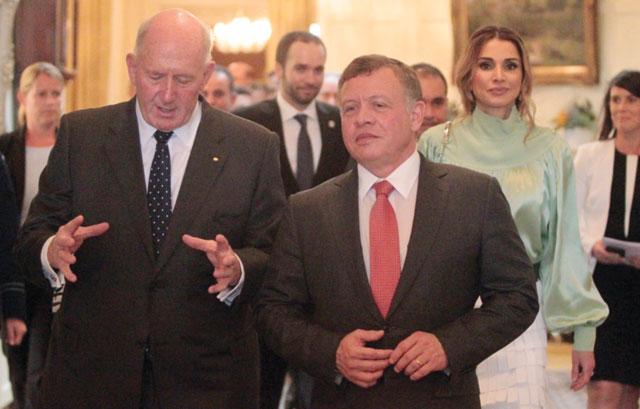You are here
King calls for holistic approach to fight global terrorism
By JT - Dec 06,2014 - Last updated at Dec 06,2014

AMMAN — His Majesty King Abdullah has called for a strategic holistic approach to address terrorism and extremism as a global phenomenon, stressing terror groups have “different names, but the same beliefs”.
In a wide-ranging interview with Charlie Rose from CBS, part of which was broadcast Friday and was due later to be aired on PBS and Bloomberg networks, His Majesty defined a strategic holistic approach as “reaching out to each other”, referring to international partners in fighting the Islamic State (IS) and its likes.
Acknowledging that Syria and Iraq should be dealt with immediately, the King referred to “other elephants in the room”, like Libya, Egypt’s Sinai, Mali, Nigeria and Somalia.
“I think as we’re getting the strategy and the tactics in place of Syria and Iraq, then people will start to focus on Libya.”
“We have to have sooner, I hope rather than later, a strategic holistic approach to being able to deal with all these organisations who actually are the same: different names, but the same beliefs.”
The King said that Jordan and the US are on the same page regarding priority, which is to address the global jihadist movement.
Russia could be a partner as many of foreign fighters come from the federation and Central Asian countries, King Abdullah told Rose, and it can start in Syria by facilitating a political solution agreed between the moderate opposition and the Syrian regime, according to the King.
“In my view, I think the Russians play a very important role… if we do pursue a political track, it’s where the Russians come into this that could help us achieve a political solution,” he said, adding that if the issue is seen from the Russian point of view, “Chechen extremist fighters are coming in to fight in Syria and Iraq that are going to be problematic because eventually they will go back and create problems. Not only that, all the other jihadists that are looking for the next place to fight, will also go back.”
Reach out to Sunni tribes
King Abdullah said that local people on the ground in both Iraq and Syria must be supported to carry on with fighting the terrorists. But most importantly, there is a need to reach out to the Sunni tribes in western Anbar that are under tremendous threat of IS.
“A lot of the tribes are being executed by ISIS and there’s a time factor that’s extremely important. What you don’t want to see is if we delay too much that the local population being massacred feel that they have no resort but to surrender and come under ISIS.”
His Majesty said that the idea of “foreign boots” in Iraq or Syria is out of question, but locals must be provided with support and equipment to tilt the balance in their favour as they fight IS.
A Muslim problem
King Abdullah said, however, that extremism as manifested in the practices of IS and similar terror groups, is particularly a challenge for the Arab and Islamic worlds.
He urged countries and leaders to step forward and declare a clear position rejecting extremists and their ideology as non-Islamic.
He said: “I personally believe that we, as Arab and Muslim countries, as I said to our Parliament, on the opening of our Parliament two months ago, this is a Muslim problem. We need to take ownership of this. We need to stand up and say what is right and what is wrong.”
“This is no reflection of our religion. This is evil. And all of us have got to make that decision. We have to stand up and say: ‘This is the line that is drawn in the sand. And those that believe in right should stand on this side. And those that don’t have to make a decision to stand on the other.’ It’s clearly a fight between good and evil. I think it’s a generational fight… I think this is a Third World War by other means.”
Three phases
King Abdullah said that the war against terrorism is a long, multi-phase one, which entails a diversity of factors, including a counter ideology in its final stage.
“I hope the short-term part of it is going to be the military. The medium term is a security aspect of it. But the long term is going to be the ideological one. So, what I’m saying is, we as Muslims have got to look ourselves in the mirror and realise that we have this problem; make this very difficult call, and then all of us come together and clearly say that, you know, these people are renegades. These people have nothing to do with Islam.”
Palestine injustice as a recruitment tool
The Monarch reiterated that the Palestinian cause remains the core issue in the Middle East, stressing that the injustice Palestinians are subject to under the Israeli occupation fuels enthusiasm among the Arab and Muslim youths to join groups like IS.
“You know, whether it’s true or not, that argument is still being used by the extremists. And countries around the world realise that they have to solve the problem for their benefit. So it’s no longer politics because of the Middle East. It now affects the national security of countries around the world,” especially since the world is engaged in a “bigger issue”.
Despite the setbacks, there is a still a chance to reach a peaceful solution to the Mideast conflict in the remaining time of US President Barack Obama’s term. US Secretary of State John Kerry’s plan for Mideast peace, “hasn’t failed yet”, the King said: “It’s still an ongoing issue. The door is still open.”
Help Egypt
King Abdullah commended the efforts being exerted by Egyptian President Abdel Fattah Al Sisi to restore stability in his country.
“Any person who is in that position, with the challenges that he or she would have, I would commend them. The set of challenges that he has to do to really help his country are unbelievable. And the main thing that he’s trying to do is bring back stability to Egypt. We need Egypt. Egypt is the lynchpin of the Middle East… We all need Egypt.”
The King added that economy is a major challenge for the Egyptian president, but he has also to deal with instability in Sinai, “which we we’re all trying to help him on”.
“He is on one of the largest borders of Libya. We’re all talking about our concerns in Syria and Iraq. Imagine what his problems are, facing Libya and what he has to deal with. So all of us have to stand by the Egyptians and by him because he’s got so much on his plate.”
US ties at their best
His Majesty described the Jordanian-US relations as “could not be better. We work, as always, in harmony in dealing with all the challenges… I have a very strong relationship with the president… He’s always been very responsive to everything I do”.
He thanked Washington for being “so gracious and so magnanimous in helping us out with its aid programme”, which the US renewed for another three years with a total value of $3 billion.
Related Articles
His Majesty King Abdullah has urged world countries concerned with countering terrorism and extremism to leave their differences behind and move on to fight “a Third World War by other means”.
Jordan's biggest challenge is the economy, His Majesty King Abdullah said, noting that this is "what keeps us up at night".
AMMAN — His Majesty King Abdullah has said that the destruction of Daesh, or ISIS, should be everybody’s priority, reiterating that the war



















